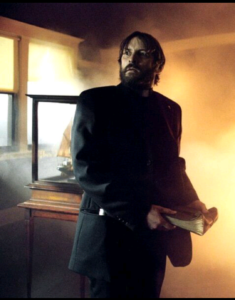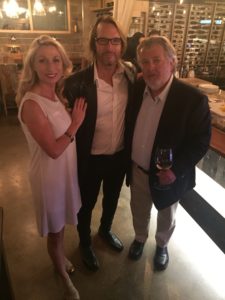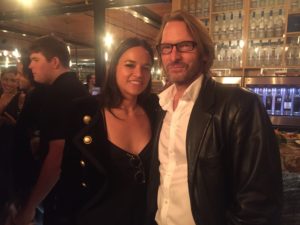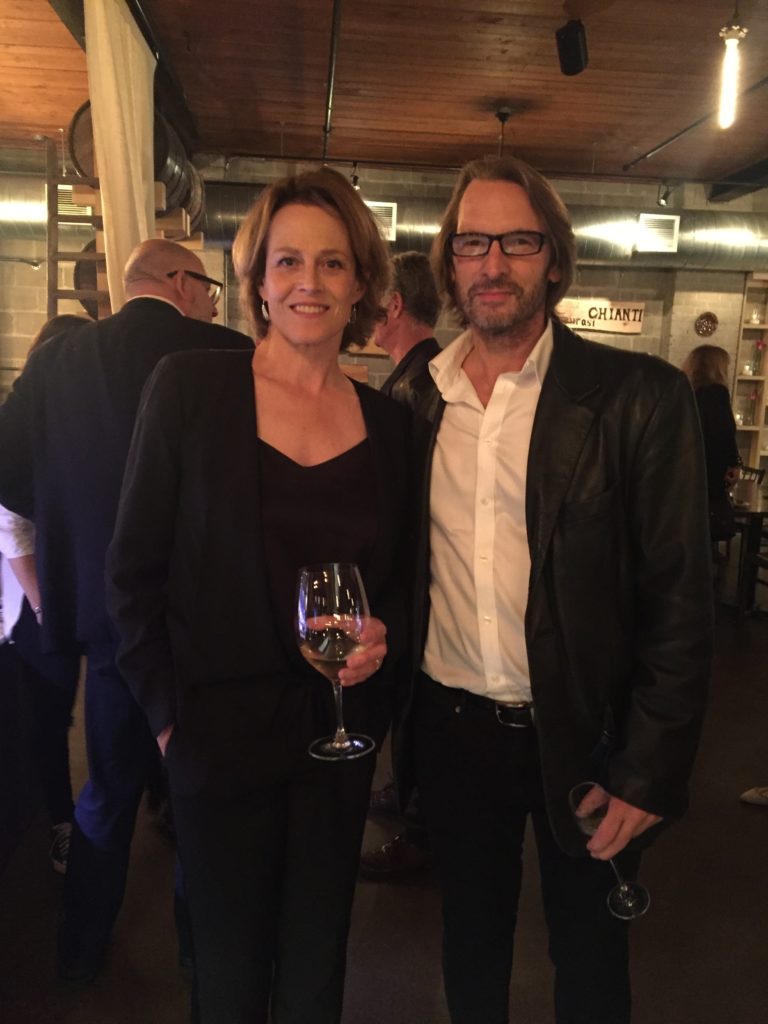Every now and again, there is an actor who once you see him/her on TV or in a film, his/her on-screen presence tends to linger even though you may only witness his/her prowess sporadically due to your frenetic schedule. Or perhaps this actor is such an immaculate performer that when you see his/her again, you don’t even realize it, for he/she so completely immerses himself/herself within the role at hand. Character actors are not just a thing of yesteryear. Indeed, they are alive and well even today, and I had the supreme honor to recently interview one of the paramount character actors of our time (at least in my opinion). In my limited experience, Adrian Hough is best known for his portrayal of the reverend in season one of When Calls the Heart. However, that is a mere pittance of the caliber of acting he has imparted to his roles which have been entrusted to him in his phenomenal career. Just this week, Adrian and I chatted about his origins within this business, his most memorable roles, and even his most recent work that is currently airing on the SyFy Channel, Aftermath.
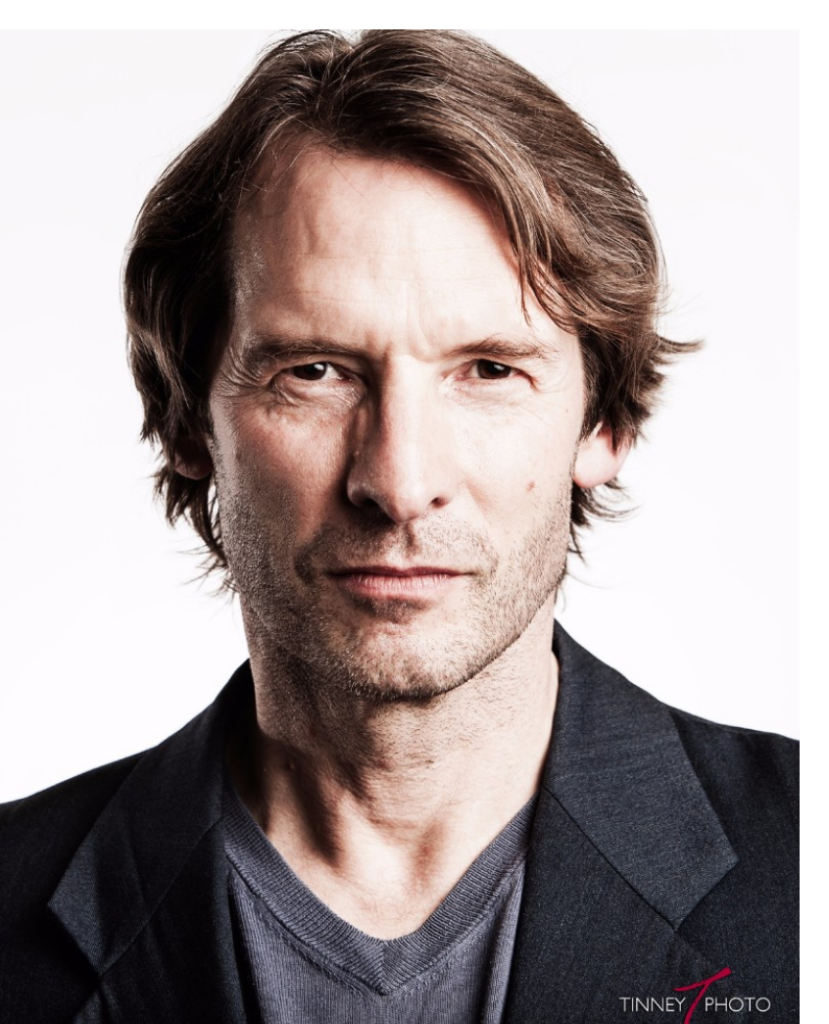
RH: Adrian, it’s so nice to get to talk to you, so let’s get started. And by the way, I am doing an audio recording, just so you know.
AH: Okay, I’ll use my best voice. I’ll use my English voice. I’ll be terribly, terribly, terribly smart. How are you?
{laughs} All right, that’ll work. I tell you, I was doing all my research on you today–
Oh?
Oh, yeah, I do try to do that before I talk to people, and you have quite an impressive resume. I was astounded as I went through it.
Thank you. It’s the sort of thing that happens when you work at something for a couple decades. And you look back and you say, “Oh yes, I did that and I did that.” If you were to ask me… because I’ve done such a vast array of things: video games, The X-Men series, as well as acting in movies. If you were to ask me, “Well, what have you done?” I probably would remember off the top of my head three or four things. But you look back, and thank goodness the internet’s there so you can say, “Oh yes, I did that in 1987.”
From what I can tell, it looks like you had the idea to get into acting when you were younger, or at least, you were headed that direction. So what were some of your early influences that caused you to think about a career in acting?
You know, I’ll give you the “Reader’s Digest” version. When I was eleven years old, I got admitted into these Saturday morning classes–extra education for gifted kids, they called it. That surprised me and my parents and everybody. I remember going there, and they had things like anthropology and geology–various historical things. But the thing that really appealed to me–’cause I was kind of a shy kid–was mime and creative drama. The teacher was this guy called Brian Taylor, who basically took me under his wing. I walked into the classroom, and the first thing he showed us how to do was the wall in mime. And for me, there was something magical about creating an illusion that people respond to. And that was kind of key for me. Something inside me went, “That! That’s what I should be doing! That’s what I wanna do. I wanna be able to create that kind of magic.”
Then, of course, as the years went by and I was growing up, throughout my teens, on the one side I was an athlete, and on the other I was this geeky mime kid. And when I was around twenty, I thought, “It’s time I opened my mouth and said something.” So I decided that the best actors I had seen were in all these BBC dramas–British things. So I said, “Well, why don’t I go and see if I could become a British actor?” And so I did that. {laughs} I actually went for about eight or nine years; I lived in London. While I was there, I got to work with Peter Capaldi from Dr. Who. I actually got to play his Scottish brother. He’s a Scot, so he taught me my Scottish accent. And I did have an idea that I was somebody who could change and morph and become lots of different things. That was my goal..to create the illusion of things and to move people.
And I saw Derek Jacobi. He’s sort of along the lines of Ian McKellen and that generation of actors. I saw him on stage when I was at drama school, and it was my birthday. It was the last month of drama school, and I went to the Barbican {Theatre} at the Royal Shakespeare Company, and he was doing Cyrano de Bergerac, and I got returned seats–just great seats. What a great birthday present. Right in the center, four rows from the front of the stage. And his performance was so magical. I swear to you that he moved his soul out of his body. During the balcony scene with Cyrano when he’s wooing the young woman, I suddenly burst into tears. I’ve never been moved in a production, movie, film..anything like the way I was when I was watching that actor performing. And that was the moment I went, “That! That’s where I should set the bar.” And I’ve spent the last thirty years just keeping on and trying to improve the work. Keep on raising the bar. British actors are actors who can change themselves and mold themselves. They can play complicated, emotional characters. Derek Jacobi, Ian McKellan, Patrick Stewart–all of those actors really influenced me when I was young.
Now, there were other actors who influenced me over the years. Hal Holbrook, who I saw, and Louise Fletcher from One Flew Over the Cuckoo’s Nest, who played an incredible Nurse Ratched in that film. But I saw her and Hal Holbrook in a television drama {Natural Enemies}. Hal Holbrook had this incredible intensity and vulnerability. He’s another actor who really influenced me. One of my very first television jobs, when I was in the UK, was working opposite Hal Holbrook. And I remember being completely in awe of him at the time, but he was a very nice and kind man. And twenty-five years after my first television job, I ended up playing the Hal Holbrook role in The Fog. And it was one of those big moments for me as an actor ’cause there’s lots of reasons why you do and don’t get roles, but I was really quite happy to get this role. And that same year, I worked with Ian McKellen and Patrick Stewart on X-Men 3.
The thing about an acting career is there are lots of periods where nothing seems to be connecting, so that’s when you’re doing the grunt work of the things like working on your craft, auditioning endlessly, going to class, going back to class, knowing in your career what’s not working and what you need to work on next. It’s literally a lifetime of…Stanislavski, a method acting teacher, said it takes twenty years to make an actor. With me, it takes me a little bit longer. {laughs}
But it is something–I have a lot of young actors who come to me for advice, and sometimes I go and do master classes for young actors. A lot of young people come to me, friends of my kids, and say, “So I really want to be an actor. How do I do it?” Well, make yourself good. You know, that’s basically it. Make yourself good, and as Steve Martin says, “Be so good that they cannot ignore you.”
As you think over your many roles, is there one or two that stand out as your most challenging roles?
Well, there’s different reasons why different roles are challenging. I’ll just randomly pick two.
The character I played in The Killing. He was a very creepy, creepy dude who is taking pictures of a young girl. And two cops come and interview him, and he does this long speech about being an artist. I found it very difficult to get into it ’cause I was judging the character; I was judging the man. Sometimes I have to play characters who I would look at and think, “They’re not a nice person.” But my challenge is that I also enjoy playing those characters because it means I have to stretch my imagination to, “What is it like to be that person? Where is their heart?” ‘Cause every character has a heart. But that character was very, very challenging from that point of view. Believe me, when I finished filming it, there was a big arrest scene where I was wrestled to the ground by a man who is also known as Robocop, and I went home with bruises.
And another one would be Haytham Kenway in Assassin’s Creed III, the video game. And the challenge of that was… people call them voice actors, but it happens that they film the entire storyline like a movie, and then they animate it over the top of us. So all the movement, all the action, all the voices, all the interactions… you have to create this life in an empty room wearing a black leotard with dots all over it and with a helmet with a camera right in front of your eyes. The camera’s capturing all your facial expressions and the microphone is also right there. And the helmet is really tight. It’s the most uncomfortable place to try to create a character with life. And the temptation is to go, “Well, it’s just a video game.” I was playing a British colonial, and I had to do the accent. And I really worked on the accent. I used all my memories of working with Ian McKellen and Patrick Stewart. And he goes from this really strict, principled man to having this crack in his personality, and his vulnerability shows up at one point. Part of the challenge was, I had to keep the part secret. At the audition when they hired me–they hired me on the spot at the callback audition. They held up something and asked if I knew what it was, and I really didn’t know. So they took me over to sign something, and I signed away my first born and left kidney; it wasn’t very much. {laughs} Then they told me that this was Assassin’s Creed III, and I had no idea what that was ’cause I wasn’t a gamer. But I was like, “Oh, good, okay.” Before the game came out the character I had was secret, but I wanted to tell everybody about it ’cause he was so fun to play. But for a year and a half, I couldn’t tell anybody. It was just something that I owned myself. Me and the other actors–it was just ours. And literally the game came out, and that day Facebook and Twitter exploded. Suddenly it was something that didn’t belong to me any more. I really loved the role, and I learned a lot about working in what is a very new medium called motion capture, which is a whole new medium for actors. It’s kind of a combination between theater and film, which also makes it challenging. Like in theater, you have to do an entire long form and development, and yet at the same time, there was one day we did thirty-eight scenes in a day. Unheard of. In film, maybe you do four or five scenes in a day.
So those are my two that stand out.
The Hearties are going to remember you from When Calls the Heart. You were in season one. Was that the first time you had gotten to work with Hallmark?
No, I’ve done a number of things with Hallmark. Time After Time with Richard Thomas is one notable one. But the first season of When Calls the Heart, the character of Reverend Anderson was definitely the most I’d done in a Hallmark show.
What was memorable about being on set of When Calls the Heart?
First of all, we were in a beautiful location. And then we had this little old Western country town, and it was really lovely to go to work every morning. And the cast was just wonderful. I remember in my audition with Michael Landon, Jr., that a lot of the actors were going in there reading the part of the reverend very strict. Reverend Anderson seems, when you look at him on paper, to be a kind of strict, stern man with a little bit of darkness. You could read a little into him…he’s a little dark-hearted. But then I remember I thought, “I don’t think that’s right. I bet he feels bad about the jealousy that’s being felt when one of the young leads takes over the church and takes over the spiritual life of the people.” I enjoyed playing someone who… yes, he has these issues. He wasn’t perfectly a good man, but he wasn’t perfectly a bad man either. So there’s this wonderful gray area. Someone with a good heart who was struggling with his own demons, with his own darkness. And because it’s Hallmark, it’s also family. It’s not a deep, dark evil soul. It was a more light on the personal issues. I think I liked that people could relate to him, and his moment of redemption as well. I like stories of redemption. There’s the pain of something and then the release, and then you know everything will be okay. But they sort of finished with me after the first season. The character goes off by himself and does his own thing.
But we are going to see you in an upcoming Hallmark film. You’re in Death Al Dente: A Gourmet Detective Mystery.
Yes, I am! I almost forgot about that! Yes, it’s a series of films with Dylan Neal and Brooke Burns, who’s just a delight on set I have to say. I just do the one scene, and it films just down the road from where I live. I just did the one role, but it’s a fun little character I did. It’s hard to describe the character. He kind of a nerdy character, and he wears these really thick glasses. It was great, and it was fun for me to have the opportunity to get into this great character.
We’ll be watching for you definitely. {pause} So I do know that you’re also in Aftermath. It just started on the SyFy Channel here in the U.S. last week. You’re in episodes two and three, I believe.
Yes, so this week and next week {October 4 and 11}. I play yet another reverend, but there’s a bit of a twist in this one. He’s not necessarily the nice reverend. Aftermath, from what you can see in the trailers, it’s the end of the world, and everything’s difficult. The apocalypse has happened. Zombies and other things are falling from the sky. Great dragons sweeping down, and all these other things are going on. A poor family at the end of the world. One of the people they come across is the Reverend Brother, who has a little community who lives according to their religion. But that’s really all I can say.
So did you get to work with Mitchell Kummen?
Yes, I got to interact with Mitchell’s character quite a bit. It’s my second time working with Mitchell since I got to work with him also on When Calls the Heart.
That’s a nice tie-in. Kind of a mini-reunion there. And you’re playing a reverend both times, albeit a different reverend this time.
Quite different reverends. But I have to say this about Mitchell. He’s one of these young actors who’s got a serious attitude towards his work. He was really present the whole time we were on set. He’s really involved in always trying to make himself better. I like to see that in a young actor. I see him modeling himself after other actors and watching the older actors and picking up things, and that’s actually the best thing he could be doing for himself. He’s got natural talent, and he’s a good-looking kid. And he’s a musician, too. He’s a very, very talented young guy.
My readers may think, “This is sci-fi, and I’m not interested in sci-fi.” And I can relate…I was once there myself. What might you say to those who might be close-minded about this genre?
The wonderful thing about science fiction is you can do just about anything. You can do a Western. You can say hugely political things in science fiction stories. And even spiritual things in science fiction stories ’cause we’re not pretending it’s any kind of current reality. There are lots of stories you can tell in science fiction that you probably couldn’t tell in a “regular” drama. It’s a very flexible medium. You can tell all kinds of stories. Look at Star Trek and the kinds of issues and ideas that they shared in that show. And in all of them. It’s quite a broad genre.
That’s really great. You gave a good defense of science fiction. {pause} So just as a last thing, I understand that you are very committed to preserving old growth forests.
Yes, well, I live in the Pacific Northwest, and near where I live, a hundred, a hundred fifty years ago, it was covered in five-hundred to thousand-year-old trees. Old growth forests take ten thousand years to develop. And yet here we are, a species that lives to be a hundred, and we’ve practically weeded out every piece of old growth forest. Thousand-year-old trees are nearly all gone. And the thing is that when they’re all gone, they’re not coming back…not for at least ten thousand years. And I just think it’s time to stop cutting them down, and yet logging companies still come out ’cause there’s money in it: short-term money for a long-term loss. So it’s something I’m quite passionate about. Preserving our environment in general, but this is an issue quite close to my heart. Trees are not just trees. If you take away a thousand-year-old pillar, it disrupts the ecosystem, and the whole ecosystem starts collapsing. And for a hundred and fifty years, we’ve been clear-cutting the West coast, and we’ve lost so much in that short period of time, and you know, it’s not coming back. So we need to preserve what’s left. That’s my feeling.
Rarely does an actor pack so much content into a relatively short interview, and as I reviewed the insightful responses Adrian gave, I was truly flabbergasted by his wealth of wit and wisdom. I suppose the fact that I am somewhat captivated by the classics makes this interview particularly special in every sense of the word. Adrian is a man who knows his craft in a way most people in the everyday workforce don’t even know their chosen profession. The sheer volume of time and resources which he has invested into his passion of acting has caused his talent and skill to skyrocket in such a way that is quite uncommon in today’s fast-paced entertainment world. As a student of antiquated Hollywood, in spite of the issues that may have existed back then, much (thankfully not all) of the new generation has lost that unwavering commitment to the work that the old-time actors possessed in spades. As Adrian spoke of his training, the moment he said Cyrano de Bergerac, the English teacher within me applauded him with thunderous acclaim. All too often, I can grow weary of witnessing adequate performances on the screen, even though there are a wide variety of current actors that I do hold in high regard. However, Adrian is in a very select class and part of a group that may all but die out in the acting world were it not for visionaries like him. He is committed not only to continuing to create roles with uncanny intensity that far supersede what is typically seen on the screen, but he is passing that knowledge onto the next generation, and when he sees promise (like Mitchell), he is quick to encourage and acclaim their accomplishments, skill, and dedication. In addition to this, Adrian is an upstanding person who genuinely cares about humankind and the environment in which we live. He is a forward-thinker, and even if in the unlikely event a person disagrees with him, there is something about the way in which he conducts himself that engenders venerable and limitless respect–all of which he is indisputably deserving. Be sure that you check out this seasoned veteran actor on the various social media links below so that you don’t miss a single step in this journey of his that is far from over. Moreover, check out Aftermath on the SyFy Network on Tuesday nights even if you’re not a “sci-fi geek,” as you may find that an open mind on your part will lead to a new and wonderful experience that may uncover new worlds to you that you never dreamed existed.
FOLLOW ADRIAN
3 Comments
-
Ruth, how VERY COOL that you were able to interview Adrian Hough! Awesome and exciting! Another amazing interview!
-
A very nice interview. I did not realize that I had seen in him in so many shows. Thank you for the very good read.
Crafty Nunn recently posted…Finally Starting Again
-
Author
And thank you for stopping by. That is the thing about character actors. We don’t always realize what we’ve seen them in.
-

